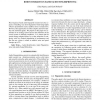Free Online Productivity Tools
i2Speak
i2Symbol
i2OCR
iTex2Img
iWeb2Print
iWeb2Shot
i2Type
iPdf2Split
iPdf2Merge
i2Bopomofo
i2Arabic
i2Style
i2Image
i2PDF
iLatex2Rtf
Sci2ools
118
click to vote
ICASSP
2010
IEEE
2010
IEEE
Robust frequency-based Audio Fingerprinting
Pure frequency-based audio fingerprint systems have the capacity of handling very short fingerprints while being highly robust to perturbations such as additive noise or compression. However, these approaches are often complex and fail to identify time stretched signals. We propose in this paper two extensions of an existing system and test the robustness of the overall system in different conditions. It is shown that the search strategy adopted allows for a clear reduction of complexity with very limited degradation of performances and that the new system is robust to additive noise and speed changes up to 5%.
Additive Noise | ICASSP 2010 | Pure Frequency-based Audio | Short Fingerprints | Signal Processing |
Related Content
| Added | 17 May 2011 |
| Updated | 17 May 2011 |
| Type | Journal |
| Year | 2010 |
| Where | ICASSP |
| Authors | Elsa Dupraz, Gaël Richard |
Comments (0)

